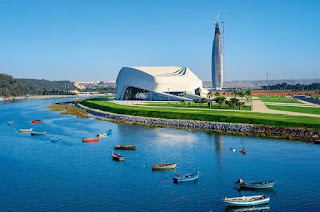Discover top attractions, gardens, museums, food, and activities with this complete travel guide for tourists.
Discover & Roam
June 22, 2025
Rabat, Morocco’s capital, is often overlooked—but it shouldn’t be. The city offers a calm, clean, and culturally rich experience. It's less hectic than Marrakech or Fes, yet filled with history, ocean views, and modern charm.
As a UNESCO World Heritage Site, Rabat blends Islamic architecture, French colonial design, and contemporary energy. It's home to royal landmarks, peaceful gardens, museums, and a breezy Atlantic coastline.
Rabat is also very walkable, has modern public transport, and is ideal for both short visits and extended stays.
Top Attractions in Rabat
Hassan Tower & Mausoleum of Mohammed V
This site is Rabat’s most iconic landmark. The Hassan Tower, an unfinished 12th-century minaret, stands tall next to the Mausoleum of Mohammed V, where Morocco's royal family is buried.
Entry is free
Guards in traditional dress add a ceremonial touch
Marble floors, white walls, and a green-tiled roof make this site highly photogenic
Kasbah of the Udayas
A peaceful hilltop fortress near the ocean, the Kasbah offers:
White and blue-painted streets
Panoramic views of the Bou Regreg River and Atlantic
A small museum and beautiful Andalusian Gardens
It’s a great spot for walking and photography.
Chellah Necropolis
Chellah is a historic Roman and Islamic burial site surrounded by nature and storks.
Explore:
Roman ruins
Merenid-era walls and tombs
Overgrown gardens and citrus trees
The atmosphere is peaceful and almost magical.
Royal Palace of Rabat (Dar al-Makhzen)
Though you can’t enter, the Royal Palace is still worth seeing from the outside. The gates, gardens, and military guards offer a glimpse into Morocco’s royal culture.
Best Restaurants in Rabat
Dinarjat
Set in a quiet alley in the old medina, this restaurant offers a refined Moroccan dining experience. Try:
Lamb tagine with prunes
Chicken pastilla
Freshly made harira soup
Elegant décor and live Andalusian music in the evening.
Le Dhow
A floating restaurant on an old wooden ship docked on the Bou Regreg River.
Perfect for:
Sunset dinners
Seafood and international dishes
Drinks with a view of the Kasbah and Hassan Tower
Yamal Acham
For something different, this spot serves traditional Syrian and Middle Eastern dishes in a cozy atmosphere. Known for:
Falafel
Shawarma
Fresh juices and mint tea
Peaceful Gardens and Parks in Rabat
Andalusian Gardens
Located inside the Kasbah of the Udayas, these gardens are free and open to the public. Expect:
Quiet paths
Flower beds and citrus trees
Benches and shade—ideal for rest after walking the Kasbah
Botanical Garden of Rabat (Jardin d’Essais Botaniques)
A larger space perfect for nature walks. Offers:
Over 600 plant species
Palm-lined paths and greenhouses
Great for families and photographers
Museums and Cultural Experiences
Mohammed VI Museum of Modern and Contemporary Art
The first museum in Morocco dedicated to modern art.
Inside, you’ll find:
Moroccan and international artists
Rotating exhibitions
A sleek, modern space with a bookstore and café
Archaeological Museum of Rabat
Small but packed with artifacts from Morocco’s ancient past—Berber, Roman, and Islamic eras.
Highlights include:
Ancient coins and jewelry
Roman sculptures
Interactive maps and tools
Activities and Day Trips
Walking Tour of the Medina
Rabat’s medina is calm and clean compared to other cities. Take a walking tour to explore:
Local markets (souks)
Artisan shops
Traditional bakeries and cafés
Boat Ride on the Bou Regreg River
Take a traditional wooden boat or modern cruise to enjoy views of Rabat and Salé.
Great for photos, especially at sunset.
Day Trip to Salé
Just across the river from Rabat, Salé is full of hidden gems:
Grand Mosque of Salé
Historical medina
Quiet local beaches
It’s a 10-minute taxi ride or boat trip away.
Travel Tips for Visiting Rabat
Language: Arabic and French are widely spoken. English is growing.
Transport: Rabat has a clean tramway system, taxis, and walkable streets.
Safety: Very safe for tourists; low pressure from street sellers.
Best time to visit: Spring (April–June) or fall (September–November) for mild weather.
Dress code: Modest dress is appreciated, especially in religious areas.
Popular Posts

Discover Morocco’s Wild Heart
June 22, 2025

Casablanca Travel Guide
June 22, 2025

Merzouga vs. Zagora for the Ultimate Desert Experience
June 22, 2025
Menu Footer Widget
Copyright ©
Discover & Roam



0 Comments